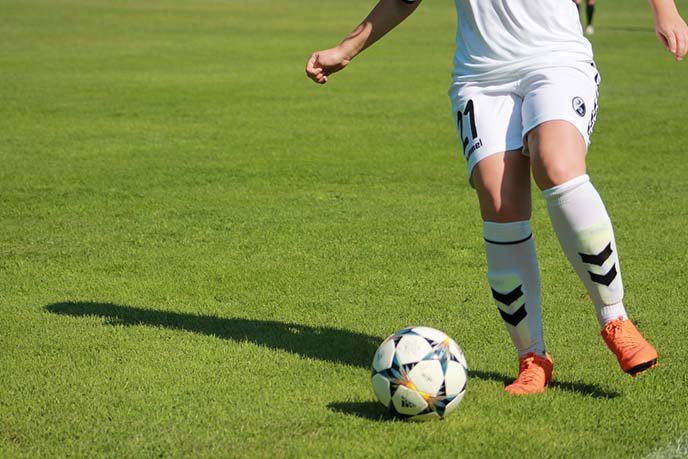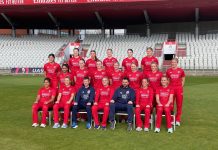Women and girls playing sport at all levels deserve kit and equipment properly researched and designed for their health and performance needs, and at a time of soaring interest in women’s sport, the sector “must do better”, the Women and Equalities Committee (WEC) has said.
The “slow and disparate response” to “disproportionately high” rates of ACL (anterior cruciate ligament) knee injuries in women’s football reflects a lack of understanding and attention given to female health and physiology-related needs, WEC warned.
Raising concerns in its report ‘Health barriers for girls and women in sport’ ahead of International Women’s Day, the cross-party committee of MPs said it had “no doubt that a health issue of similar magnitude affecting elite male footballers would have received a faster, more thorough, and better coordinated response”.
Citing ex-England player and broadcaster Karen Carney’s review of women’s football, WEC concluded the issue is “indicative of systemic gender inequality in sports and exercise research, which is still overwhelmingly conducted by men, looking at issues affecting men”.
WEC emphasised that the first specialist football boot in the world designed around female feet came to the market only four years ago, and that “limited progress” has been made by the mainstream sports brands, who between them have produced “only a handful” of football boots designed specifically for the needs of girls and women. Some of those that are available are at a price many people cannot afford, WEC added.
Setting out a series of wide-ranging recommendations, WEC called on the DCMS (Department for Digital, Culture, Media and Sport) and DfE (Department for Education) to establish a taskforce, including UK Sport, the UK Sports Institute, women’s health and fitness experts including The Well HQ, sport and exercise research institutes, and the UK divisions of leading sportswear and sporting goods brands, to develop a long-term strategy to tackle sportswomen’s health and physiology-related issues.
WEC recommended this strategy should set out key priorities for research; actions to increase availability of suitable, female-specific sportswear and kit (and given the associations with discomfort and injury, football boots must be a priority); and steps to achieve equal representation of women, as authors and study participants, in the field of sports and exercise research, with the strategy published within six months.
Girls, the report said, face distinctive health and physiology-related barriers to participation in, and enjoyment of, sport and physical activity, from early years to post-puberty, but existing programmes “do not yet go far enough” and are “yet to reverse alarming downward trends in girls’ enjoyment of PE”.
WEC urged the DfE to urgently review the quality and timeliness of education on girls’ health and physiology, including the effects of puberty, the menstrual cycle, and periods in the context of PE and school sport.
The evidence on girls’ anxieties around PE kit is “overwhelming”, it added and called on the DfE and the recently established National Physical Activity Task Force to review guidance for schools on school PE kit, with the aim of ensuring all schools permit the widest possible choice for girls.
The report recommended Sport England launch a new strand of the “This Girl Can” campaign aimed at parents, tackling early years gender stereotypes around physical activity and sport.
Women in midlife and beyond, it noted, face specific barriers to sports participation, including perimenopausal and menopausal symptoms, gendered caring responsibilities for children and elderly relatives, and the time pressures of work when many women are at the peak of their careers.
Yet the report found current efforts, including the Government’s Get Active strategy, are “inadequate for this group” and “must be rectified”. WEC recommended Sport England prioritise another phase of the “This Girl Can” campaign focused on women in midlife, showing real life examples of women in the 40- to 60-year-old age group participating in a wide range of sports and physical activities, to inspire others.
On coaching, the report said the level of knowledge and support for sportswomen’s health needs varies greatly between individual coaches and coaching teams. WEC added women’s sport would benefit from greater coordination and sharing of best practice across the sports and exercise sector to ensure that all girls and women receive adequate support from appropriately qualified coaches.
The report examined harmful coaching practices in swimming, including “wholly unacceptable” public weighing and body-shaming of girls and young women, adding that for this to have occurred in a sports environment, in which girls already face barriers to participation, is deplorable.
WEC found issues of bullying, harassment, abuse, and discrimination were not limited to swimming, with issues emerging across several sports in recent years, the report said, adding it welcomed the DCMS’s call for evidence on integrity in sport, which closed three months ago, and it expected to see tangible actions as a result.
On maternity policies, WEC concluded there is “still a long road to travel”, both in maternity pay and leave and the wider culture of supporting pregnant women and mothers, adding these issues are key to women’s equality in sport.
It recommended the Government should take a role in supporting best practice, calling on the DCMS, UK Sport, Sport England and the sports’ national governing bodies to establish a permanent working group on best practice in pregnancy and maternity policy, including maternity leave and pay and wider policies to support pregnant sportswomen and returning mothers.







